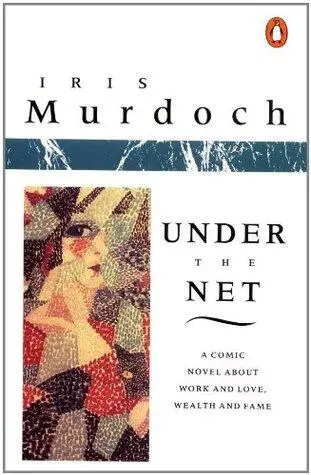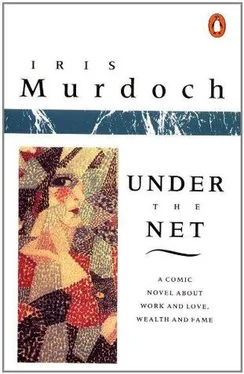
Iris Murdoch
Under the Net
First published in 1954
All, all of a piece throughout:
Thy Chase had a Beast in view:
Thy Wars brought nothing about;
Thy Lovers were all untrue.
'Tis well an old Age is out,
And time to begin a New.
DRYDEN, The Secular Masque
To
RAYMOND QUENEAU
One
When I saw Finn waiting for me at the corner of the street I knew at once that something had gone wrong. Finn usually waits for me in bed, or leaning up against the side of the door with his eyes closed. Moreover, I had been delayed by the strike. I hate the journey back to England anyway; and until I have been able to bury my head so deep in dear London that I can forget that I have ever been away I am inconsolable. So you may imagine how unhappy it makes me to have to cool my heels at Newhaven, waiting for the trains to run again, and with the smell of France still fresh in my nostrils. On this occasion too the bottles of cognac which I always smuggle had been taken from me by the Customs, so that when closing time came I was utterly abandoned to the torments of a morbid self-scrutiny. The invigorating objectivity of true contemplation is something which a man of my temperament cannot achieve in unfamiliar towns in England, even when he has not also to be worrying about trains. Trains are bad for the nerves at the best of times. What did people have nightmares about before there were trains? So all this being considered, it was an odd thing that Finn should be waiting for me in the road.
As soon as I saw Finn I stopped and put the cases down. They were full of French books and very heavy. I shouted 'Hey!' and Finn came slowly on. He never makes haste. I find it hard to explain to people about Finn. He isn't exactly my servant. He seems often more like my manager. Sometimes I support him, and sometimes he supports me; it depends. It's somehow clear that we aren't equals. His name is Peter O'Finney, but you needn't mind about that, as he is always called Finn, and he is a sort of remote cousin of mine, or so he used to claim, and I never troubled to verify this. But people do get the impression that he is my servant, and I often have this impression too, though it would be hard to say exactly what features of the situation suggest it. Sometimes I think it is just that Finn is a humble and self-effacing person and so automatically takes second place. When we are short of beds it is always Finn who sleeps on the floor, and this seems thoroughly natural. It is true that I am always giving Finn orders, but this is because Finn seems not to have many ideas of his own about how to employ his time. Some of my friends think that Finn is cracked, but this is not so; he knows very well indeed what he is about.
When Finn came up to me at last I indicated one of the cases for him to carry, but he did not pick it up. Instead he sat down on it and looked at me in a melancholy way. I sat down on the other case, and for a little while we were silent. I was tired, and reluctant to ask Finn any questions; he would tell all soon enough. He loves trouble, his own or other people's without discrimination, and what he particularly likes is to break bad news. Finn is rather handsome in a sad lanky fashion, with straight drooping brownish hair and a bony Irish face. He is a head taller than me (I am a short man), but he stoops a little. As he looked at me so sadly my heart sank.
'What is it?' I said at last.
'She's thrown us out,' said Finn.
I could not take this seriously; it was impossible.
'Come now,' I said kindly to Finn. 'What does this really mean?'
'She's throwing us out,' said Finn. 'Both of us, now, today.' Finn is a carrion crow, but he never tells lies, he never even exaggerates. Yet this was fantastic.
'But why?' I asked. 'What have we done?'
'It's not what we've done, it's what she's after doing,' said Finn. 'She's going to get married to a fellow.'
This was a blow. Yet even as I flinched I told myself, well, why not? I am a tolerant and fair-minded man. And next moment I was wondering, where can we go?
'But she never told me anything,' I said.
'You never asked anything,' said Finn.
This was true. During the last year I had become uninterested in Magdalen's private life. If she goes out and gets herself engaged to some other man whom had I to thank but myself?
'Who is this person?' I asked.
'Some bookie fellow,' said Finn.
'Is he rich?'
'Yes, he has a car,' said Finn. This was Finn's criterion, and I think at that time it was mine too.
'Women give me heart disease,' Finn added. He was no gladder than I was at being turned out.
I sat there for a moment, feeling a vague physical pain in which portions of jealousy and wounded pride were compounded with a profound sense of homelessness. Here we were, sitting in Earls Court Road on a dusty sunny July morning on two suitcases, and where were we to go next? This was what always happened. I would be at pains to put my universe in order and set it ticking, when suddenly it would burst again into a mess of the same poor pieces, and Finn and I be on the run. I say my universe, not ours, because I sometimes feel that Finn has very little inner life. I mean no disrespect to him in saying this; some have and some haven't. I connect this too with his truthfulness. Subtle people, like myself, can see too much ever to give a straight answer. Aspects have always been my trouble. And I connect it with his aptness to make objective statements when these are the last things that one wants, like a bright light on one's headache. It may be, though, that Finn misses his inner life, and that that is why he follows me about, as I have a complex one and highly differentiated. Anyhow, I count Finn as an inhabitant of my universe, and cannot conceive that he has one containing me; and this arrangement seems restful for both of us.
It was more than two hours till opening time, and I could hardly face the thought of seeing Magdalen at once. She would expect me to make a scene, and I didn't feel energetic enough to make a scene, quite apart from not knowing anyway what sort of scene I ought to make. That would need some thinking out. There is nothing like being ousted for making one start to specify what it is one is being ousted from. I wanted time to reflect on my status.
'Would you like a cup of coffee in Lyons'?' I said to Finn hopefully.
'I would not,' said Finn; 'I'm destroyed already waiting for you to come back, and herself wishing me at the devil. Come on now and see her.' And he started off down the street. Finn never refers to people otherwise than by pronouns or vocatives. I followed him slowly, trying to work out who I was.
Magdalen lived in one of those repulsive heavy-weight houses in Earls Court Road. She had the top half of the house; and there I had lived too for more than eighteen months, and Finn as well. Finn and I lived on the fourth floor in a maze of attics, and Magdalen lived on the third floor, though I don't say we didn't see a lot of each other, at any rate at first. I had begun to feel that this was my home. Sometimes Magdalen had boy friends, I didn't mind and I didn't inquire. I preferred it when she had, as then I had more time for work, or rather for the sort of dreamy unlucrative reflection which is what I enjoy more than anything in the world. We had lived there as snug as a pair of walnuts in their shells. We had also lived there practically rent-free, which was another point. There's nothing that irritates me so much as paying rent.
Magdalen, I should explain, is a typist in the city, or she was at the time of the earlier events related in this story. This hardly describes her, however.
Читать дальше











